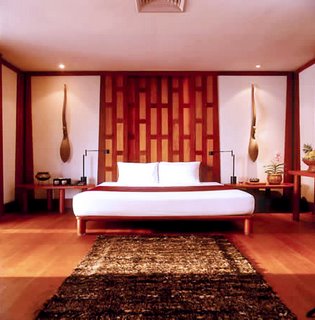Pat's Travelogue
"We live in a century in which everything has been said. The challenge today is to learn which statements to deny".
Saturday, April 29, 2006
Saturday, April 22, 2006
Wednesday, April 19, 2006
Sabai Sabai Massage House, Thailand
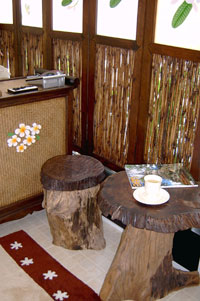 Waiting Area w/herbal tea and magazine.
Waiting Area w/herbal tea and magazine.
For Appointment, Call
0-2960-1949
0-5138-1785
Massage Menu:
Full Body Massage 119 Bahts @Hour
Foot Massage 129 Bahts @Hour
Head, Shoulder & Back Massage 99 Bahts @Hour
Aromatic Oil Massage 279 Bahts @Hour
Sabai Sabai Massage
Located in Muangthong Thani
Nonthaburi
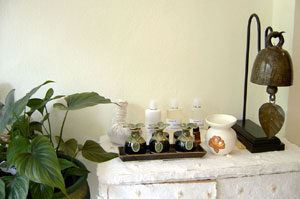 Spa Products on the Display Table.
Spa Products on the Display Table.Sunday, April 16, 2006
Monday, April 10, 2006
Sunday, April 09, 2006
Friday, April 07, 2006
Asian Medical Tourism



 Asian medical tourism to become multi-billion-dollar industry: report
Asian medical tourism to become multi-billion-dollar industry: reportBy Manager Online
7 April 2006 17:24
April 7, 2006 SINGAPORE (AFP) - Asia's medical tourism industry is expected to generate over 4.4 billion dollars a year by 2012, with India, Thailand, Singapore, Malaysia and South Korea the top destinations, a leading travel firm said Friday. Low-cost, high-quality healthcare in Asia is already attracting more than 1.6 million tourists each year, mostly from within the region, according to a report issued by Singapore-based air ticketing firm Abacus International. "Asia is a preferred healthcare destination and is set to grow further, fuelled by the relatively low-priced healthcare services available," Abacus president Don Birch said. According to the report, medical tourism -- which refers to trips combining treatment and check-ups with leisure -- is growing by 20 to 30 percent each year with the industry now worth around half a billion dollars a year in Malaysia, Thailand, Singapore and India. "Asia is an ideal growth environment ... with competitively-priced quality healthcare service in major tourist cities," Birch said. Thailand welcomes more than one million medical tourists each year because of the variety of procedures available, Abacus said. Bumrungrad International Hospital for example offers a full spectrum of surgical services performed by certified doctors all under one roof. Singapore, on the other hand, is known for delivering cutting-edge medical treatment and attracts medical tourists with its competitively priced services. For example, hip-replacement surgery costs two-thirds less in Singapore than in the United States, the report said. The city-state attracts 370,000 medical tourists each year and is targeting one million medical visitors and 1.6 billion dollars in revenue by 2012. India, whose medical tourism business is growing at 30 percent per year, currently draws about 150,000 visitors each year. It is forecast to generate at least 2.2 billion dollars by 2012. "India (is) providing first-class service at a third-world price", the report said. It cited the low death rate for coronary bypass operations as evidence of quality healthcare. Malaysia, which drew 100,000 patients in the first half of 2005, expects its medical tourism receipts to reach 590 million dollars in five years' time. Although most of these tourists are from Asia, Birch said that some come from the United States and Europe as well. "The long haul market is important and growing (but) much of the business is intra-Asia," Birch said. The key sources of patients are Indonesia, Malaysia, the Middle East and China, he added.
Thursday, April 06, 2006
Bhutan Travel Tips

The Kingdom of Bhutan is nuzzled in the eastern Himalayas, north of India and south of Tibet. Not only is it in the mountains, it is virtually all mountain. The country ranges in elevation from about 600 feet to 24,778 feet, and only 8% of the land is tillable.
Flying in on the exclusive airline, Druk Air, is the only way for travelers to get there. It has a fleet consisting of two 72-passenger airplanes and has the distinction of being the only airline to routinely fly over eight of the tallest peaks in the world. The word Druk means Dragon. Druk Yul is what Bhutanese call their country, translated as the 'Land of the Thunder Dragon'.
Bhutan is known as one of the top ten bio-diversity hot spots in the world, with an estimated 165 mammal and 5,500 plant species, 500 of which are considered medicinal. There are about 770 bird species.
Bhutan is known as one of the top ten bio-diversity hot spots in the world, with an estimated 165 mammal and 5,500 plant species, 500 of which are considered medicinal. There are about 770 bird species.
72% of the Kingdom is covered with forests. A remarkable 26% of the entire country is protected by national parks and sanctuaries. Most of the giant peaks have never been explored by westerners and are considered home to the deities, so climbing them is not allowed. Bhutan is so protective of its environment that killing a black-necked crane means life imprisonment. Plastic bags are illegal.
In many ways, Bhutan epitomizes both the dual qualities of protection and vulnerability. Nestled in the Himalayas, the country is virtually all mountain. The highest peaks are considered sacred, and have never been climbed by westerners. Some of the country has not been mapped. In part because of this inaccessibility, Bhutan has never been colonized. The only foreign invasions they've faced have been from their Tibetan neighbors to the north, and those wars have been fought with bows and arrows. Until recently, one village considered itself protected because it was surrounded with cactus. There were virtually no roads until the 1970s. Their rivers are neither dammed nor diverted.
The king reports their most important product of the country is "gross national happiness." The king of Bhutan, His Majesty Jigme Singye Wangchuck, is respected both internationally and at home. In his 26-year reign he's been credited with opening Bhutan to the visitors for the first time. Bringing in travelers and trekkers is one thing, but delivering Bhutan to the 21st century is quite another.
Bhutan's resources are as vulnerable as they are impressive. It has a population of about 650,000 people, most of whom are scattered in remote valleys narrowly wedged between high mountains. It measures 180 miles long and 100 miles wide, a land mass about one-fifth the size of Oregon. The majority of people live on subsistence farming with an average annual income of $510.00.
Starting in 1999 and for the first time ever, Bhutanese were required to pay income tax. Roads have been built within the last 20 years, and though they connect some regions, most of the country can only be reached by footpath. In order to be cautious with its capacity to absorb visitors, Bhutan's annual tourist count is about 7,000. There are domestic conflicts with the Nepalese immigrant population. Major earthquakes have been rocking the region, and scientists predict more to come.
Tuesday, April 04, 2006
Thaksin resigns.
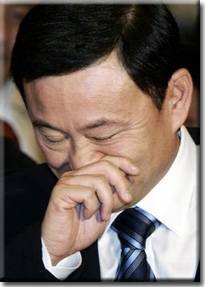
Thai PM resigns following poor election performance04/04/2006 - 14:42:11 Thailand’s embattled Prime Minister Thaksin Shinawatra today said he would step down from office following his party’s disappointing showing in national elections.“I am sorry that I will not accept the premier post,” Thaksin told a news conference.His announcement comes as opposition forces were gearing to resume their anti-government protests and early election results showed his popularity had plummeted amid allegations of corruption and abuse of power.Thaksin won 57% of Sunday’s ballot, according to preliminary results, but scores of voters abstained, including a majority in the capital, Bangkok.
One legitimate reason for the opposition to capitalism in Thailand is that it frequently has been "crony capitalism" as opposed to the competitive capitalism that produces desirable social outcomes. Crony capitalism is a system where companies with close connections to the government gain economic power not by competing better, but by using the government to get favored and protected positions. These favors include monopolies over telecommunications, exclusive licenses to import different goods, and other sizeable economic advantages. Some cronyism is found in all countries, but Thailand this time has often taken the influence of political connections to extremes.
Workers Have Retirement 'Overconfidence'.
By EILEEN ALT POWELL.
The majority of American workers think they'll be able to retire comfortably, but most aren't saving nearly enough to meet that goal, according to a new study.
The Employee Benefit Research Institute's annual retirement confidence survey, released Tuesday, found that about 68 percent of workers are confident about having adequate funds for a comfortable retirement, up slightly from 65 percent in 2005.
At the same time, more than half of all workers say they've saved less than $25,000 toward retirement, according to the Washington, D.C., based research group. Even among workers 55 and older, more than four in 10 have retirement savings under $25,000.
"`Overconfidence' is the word that comes to mind," said Jack VanDerhei, co-author of the study.
He said that the poor savings performance was especially troubling because it comes as many of the nation's employers are eliminating the defined benefit plans — better known as pensions — that have buoyed the retirements of current workers' parents and grandparents. Many companies also are eliminating retiree health care coverage or asking retirees to contribute more for it.
"It's clear that people currently working should factor into their retirement planning the long-term trend away from traditional defined benefit pensions," VanDerhei said. "That means people need to be saving more than they are."
Not all was doom and gloom in the report, the 16th in a series begun in 1991.
More than 70 percent of workers say that they or their spouses have saved something toward retirement — a percentage that's held fairly level for the past six years, EBRI said.
And while many have meager savings, others are doing quite well at accumulating retirement nest eggs, the study found.
While more than half of workers have less than $25,000 set aside, 12 percent have $25,000 to $49,999; 12 percent have $50,000 to $99,999; 11 percent have $100,000 to $249,999; and 12 percent have $250,000 or more.
As would be expected, older workers generally have more set aside than younger workers, with 12 percent of those 55 and older reporting account balances of $100,000 to $249,999, and 26 percent with accounts of $250,000 and up.
VanDerhei believes that people would save more if they took the time to project what their costs in retirement are likely to be. But just 42 percent of workers say they've done such a calculation.
He suggests that people who are comfortable with managing their own accounts can do well with online calculators, including the Ballpark Estimate calculator that can be found on EBRI's sister site at http://www.choosetosave.org/ballpark.
"But some people are absolutely clueless about this and frozen into inactivity as a result," he said. "They really should find a fee-based professional to help them out. It's going to cost a couple of hundred dollars, but you'll make that amount up many times in the future."
The study also found that workers are eager for help in saving more.
Nearly 70 percent of workers said they were either strongly favorable or somewhat favorable to 401(k) and other retirement plans setting up automatic enrollment for new workers, and almost the same percentage favored automatic increases in employee contributions.
Dan Houston, senior vice president for retirement and investor services with Principal Financial Group Inc. in Des Moines, Iowa, said that if workers are told they aren't saving enough, most are willing to increase their 401(k) contributions — including automatic increases each year.
He added that workers should aim to save enough to replace 85 percent of their preretirement income when they stop working, not the 70 percent that many workers believe is adequate.
That may sound daunting, but Houston said a 25-year-old man or woman entering the work force today who immediately starts saving 15 percent of income will be able to retire at 60 with enough savings to do that.
"If you adjust your standard of living right after school, and learn to set aside 15 percent — either by salary deferral or company match — it's doable," he said.
A number of large companies have begun introducing automatic enrollment into their plans to try to get higher participation by younger and lower-income workers, but adoption hasn't become widespread.
The survey was conducted by Mathew Greenwald & Associates, a survey research firm based in Washington, D.C. It involved phone interviews with more than 1,250 individuals, with a margin of error of plus or minus 3 percentage points. Principal Financial was among the underwriters of the study.
Temasek Holdings to takeover Shin.
Jan 18, 2006
(Thai Press Reports via NewsEdge) The Shinawatra clan will soon sell off its entire stake in Shin Corp to Singapore's Temasek Holdings without any buy-back option, sources familiar with the deal said.
Quoting sources, a report carried by The Nation said the deal will be carried out in the next two weeks.
The takeover is a pure cash deal, not involving a share swap for Temasek's shares in SingTel as earlier reported, said a source who asked not to be named.
A source close to the deal earlier estimated the transaction value at 80 billion baht ($2 billion).
The sources said Prime Minister's Thaksin Shinawatra's family and his in-laws, the Damapong family, who together hold a 49.61% stake in Shin, wanted to “end all connections with the company.”
They quoted Thaksin as saying that the deal would eliminate entirely criticisms about conflicts of interest.
Shin's interests cover a wide range of companies, including AIS, Shin Satellite, iTV, Thai AirAsia and Capital OK.
All executives of Shin and related companies will maintain their positions after the sale and only Thaksin's youngest sister Yingluck, currently AIS president, will have to move out, sources said.
© 2006 Thai Press Reports
Puppet Pleasures

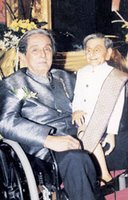
Did you know that a demon occasionally eats the moon?
In ancient times, that was the explanation provided to explain lunar eclipses. According to traditional Thai and Hindu beliefs, a demon called Rahoo stole an elixir to make himself immortal, but the Moon sees this and reports it to Phra Narai (Vishnu). Narai confronts Rahoo, who throws his crystal chakra at the demon, cutting him in half. However, since he’s immortal, the top half of his body floats around in the sky. Whenever he sees the Moon, he tries to eat it. And that’s when the phenomenon occurs
Monday, April 03, 2006
International community uneasy about Thai election.

By Martin Petty
3 April 2006 23:14
Foreign concerns about Thailand’s political stability will grow as a result of Sunday’s controversial election, experts said yesterday, as the international media appeared to cast doubt on the prime minister’s ability to continue running the country.Caretaker Prime Minister Thaksin Shinawatra last night claimed victory with 16 million votes from the 28 million cast, but foreign newspapers focused on the fragility of the country’s democracy and the prospect of ending the crisis with Thaksin still in power.Newspapers across the globe highlighted the bizarre circumstances under which the elections were held, with several prominent dailies describing the massive number of “No Votes” cast as a slap in the face for the premier.The New York Times said protest votes had made the election one of the most unusual in recent Southeast-Asian history and Australia’s The Age called the poll a “bizarre parody of the democratic process.”The Daily Telegraph in London said Thaksin’s political gamble threatened to backfire and as a result, the country was “heading for a constitutional crisis.”The polls had ended “with a mood of despair and unease,” Singapore’s Straits Times reported.The international community has so far been reluctant to voice concerns about the political crisis, although with plenty of spoiled ballots, protest votes and disqualified candidates, coupled with widespread allegations of vote-buying and electoral fraud, observers say that silence will soon be broken.Kasit Pirom, a former Thai ambassador to the United States and member of an anti-Thaksin alliance, said diplomats had been tight-lipped because Thaksin had followed the Constitution all along, but the powerful number of “No Votes” highlighted the discontent many have with his rule.“The international community will come to the realization that the problem is with the prime minister and they must act.”
Nepotism and Corruption Protest against PM.

 Nepotism
NepotismIn Bangkok, nepotism is a major concern. The prime minister's cousin, General Chaiyasit Shina-watra, is now commander in chief of the army. One of Thaksin's sisters, Yaowapha Wongsawat, heads a faction within the governing Thai Rak Thai Party. Another sister, Yaovares Shinawatra, is the leader of the National Council of Women.
Somkiat Tangkitvanich, an economist and a research director at the Thailand Development Research Institute, recently completed a study of how political connections affected Thai businesses. His analysis showed that companies on the Bangkok stock exchange in which the Shin Corp, the Thaksin family's company, owned significant holdings, did spectacularly better last year than other listed companies, including those whose major shareholders included families of Cabinet members.
Further, Somkiat said, a government decree effectively barred the liberalization of the telecommunications industry, which is dominated by the Thaksin family company. The decree added an excise tax on new telecommunication companies.
Media under pressure
Since Thaksin took office, news organizations have come under intense pressure from the government. The editor of the influential English-language daily, The Bangkok Post, Veera Pratheepchaikul, was removed last month after the newspaper ran articles critical of Thaksin. Other journalists and editors have been dismissed. The family of a senior Cabinet member has become a major stockholder of a second English-language daily, The Nation.
Asked about the assertion that the government policies favored the prime minister's family interests, Thaksin's spokesman, Jakrapob Penkair, said: "The prime minister wants the economy to be better off because then everyone benefits. He compares the economy to a container. When it rains, a big container collects more water, a small container less."
Giving a rendition of trickle-down economics, Jakrapob said those who had a big container in the economy -- the wealthy -- received "more reward" but those with a small container also benefited.
Somkiat, the economist who studied the Thaksin administration, said, "I'd say Thaksin has the only container."


